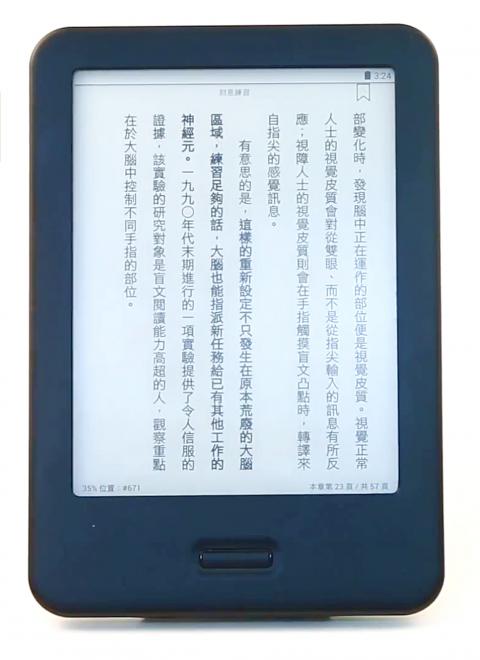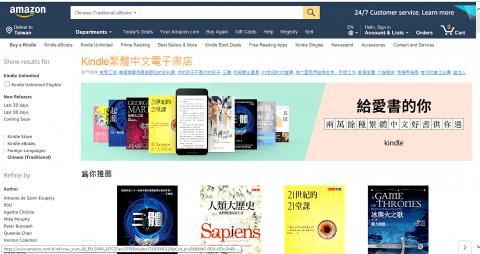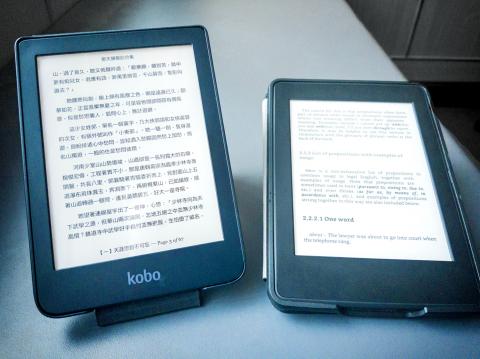Amazon officially launched the traditional Chinese Kindle e-book platform on May 24. Now users have access to over 20,000 e-books in traditional Chinese through the Kindle app or Kindle-reader devices.
Of the 40,000 books published per year in Taiwan, with its population of 23 million, only 3 percent are electronic books. Amazon has previously announced its plan to move into Taiwan and enter the traditional Chinese e-book market.
Over a year ago, Amazon’s Beijing team, including its operational and technical department members, visited Taiwan to assess its market potential. They found that despite impressive publishing volumes, Taiwan’s market was too small, and exploiting its potential would present a challenge.

Photo: Screen grab from YouTube
照片:擷圖自YouTube
Although Taiwanese account for 90 percent of the sales of e-books published in Taiwan, readers of traditional Chinese books can be found all around the world. Amazon’s breaking into the traditional Chinese e-book publishing gives it access not only to Taiwan’s market, but also to consumers of traditional Chinese readers worldwide. The new platform will enable e-books to reach places paper-based books previously did not, so publications in traditional Chinese can now be distributed in large volumes throughout the globe.
With the clear potential for growth in the e-book market, many book-selling platforms have embraced e-books over the past two years. Reading this trend, publishers will be encouraged to increase publication of e-books, making the e-book market more vibrant.
Chinese-language books form an important sector for global publishing, and Amazon is one of the world’s leading e-commerce companies. Domestic e-book platform operators are optimistic about Amazon’s breaking into Taiwan’s e-book market as, with the clear upward trend in e-book sales, increasing numbers of Taiwanese books can be sold to the global Chinese-reading market through Amazon’s platform.

Photo: Screen grab from Amazon’s Online Shop
照片:擷圖自亞馬遜購物網
In addition to e-book content, many major e-book platforms have also developed their own reading devices, such as the Amazon Kindle and Rakuten Kobo from overseas companies. Taiwanese e-book company Readmoo has also developed its own reader MooInk, which is optimized for reading in Chinese.
(Translated by Lin Lee-kai, Taipei Times)
亞馬遜五月二十四日正式推出繁體中文Kindle電子書市,使用者可透過應用程式或Kindle閱讀器,購買已上架的兩萬多本繁體中文書籍。

Photo: Paul Cooper, Taipei Times
照片:台北時報記者古德謙攝
台灣兩千三百萬人口每年出版量可達四萬本,但電子書市占率只有約百分之三。亞馬遜之前就宣布要進軍台灣,競逐繁體中文電子書市場。
亞馬遜一年多前從美國帶著北京團隊,營運、技術部門一行人來台考察,但即使台灣出版產量驚人,由於市場太小,要賣給誰、怎麼賣,一直是個大問題。
台灣電子書有百分之九十的購買者都在台灣,但閱讀繁體中文書的人散落世界各地。亞馬遜繁體中文書上架,不只是看上台灣市場,而是看上全球閱讀繁中書籍的市場。以前實體書無法到達之處,透過電子書平台皆可觸及,未來繁體中文書可大量輸出到其他國家。
未來電子書的成長趨勢明顯,這兩年很多購書平台走向電子書。隨著閱讀型態改變,出版商出電子書的意願也將提高,電子書市場變成一個熱絡的市場。
華文是全球出版重要的一環,亞馬遜是全球最重要的電商之一,對於亞馬遜電子書進軍台灣,國內電子書平台業者皆樂觀以待,認為電子書成長趨勢明顯,透過亞馬遜的平台,台灣書可以賣到全球中文閱讀市場。
除了電子書內容,許多主要電子書平台也開發出各自的閱讀器,例如飄洋過海來台的亞馬遜Kindle和樂天Kobo,以及台灣本土的讀墨Readmoo專為繁體中文閱讀而生的mooInk電子書閱讀器。
(中央社)

California will phase out certain ultra-processed foods from school meals over the next decade under a first-in-the-nation law signed on Oct. 8 by Gov. Gavin Newsom. The law seeks to define ultra-processed foods, the often super-tasty products typically full of sugar, salt and unhealthy fats. The legislation requires the state’s Department of Public Health to adopt rules by mid-2028 defining “ultra-processed foods of concern” and “restricted school foods.” Schools have to start phasing out those foods by July 2029, and districts will be barred from selling them for breakfast or lunch by July 2035. Vendors will be banned from providing the “foods

In today’s fast-paced world, many individuals are turning to alternative lifestyles that prioritize sustainability and simplicity. Two such lifestyles are sustainable living and minimalism. They both share some common threads: living more intentionally, reducing our environmental impact, and focusing on what truly matters. 1. Sustainable Living Sustainable living is about making choices that are environmentally friendly in every aspect of one’s life. The primary goal is to minimize one’s ecological footprint, conserve natural resources, and reduce waste. It might sound abstract, but in fact, it is rather easy to practice sustainable living. What we eat has a great impact on the environment. Small

Have you ever bought a new smartphone and suddenly found yourself dissatisfied with your perfectly fine headphones? Before long, you’ve purchased premium wireless earbuds, a protective case and a fast-charging station. What begins as a single acquisition snowballs into a shopping spree—this is the Diderot effect in action. Named after the 18th-century French philosopher Denis Diderot, the Diderot effect originates from an essay he wrote. In it, he recounted receiving a luxurious robe as a gift. As lovely as it was, the robe clashed with the rest of his humble belongings. One by one, he replaced his possessions to match the

對話 Dialogue 清清:華華,你知道這禮拜為什麼又有三天連假嗎? Qīngqing: Huáhua, nǐ zhīdào zhè lǐbài wèishénme yòu yǒu sān tiān liánjià ma? 華華:知道啊!10月25號是臺灣光復節,從今年起,又是可以放假的國定假日了。剛好碰到禮拜六,所以禮拜五多補一天假。 Huáhua: Zhīdào a! Shí yuè èrshíwǔ hào shì Táiwān Guāngfù Jié, cóng jīnnián qǐ, yòu shì kěyǐ fàngjià de guódìng jiàrì le. Gānghǎo pèngdào lǐbài liù, suǒyǐ lǐbài wǔ duō bǔ yì tiān jià. 清清:對了! 我想起來了,聽我爸媽說過,以前十月有好幾天都放假,光復節是其中之一。 Qīngqing: Duìle! Wǒ xiǎng qǐlái le, tīng wǒ bàmā shuōguò, yǐqián shí yuè yǒu hǎojǐ tiān dōu fàngjià, Guāngfù Jié shì qízhōng zhī yī. 華華:光復節是慶祝日本人在二次世界大戰結束後,離開臺灣的日子。 Huáhua: Guāngfù Jié shì qìngzhù Rìběn rén zài Èrcì Shìjiè Dàzhàn jiéshù hòu líkāi Táiwān de rìzi. 清清:那是一九四五年的事了。 Qīngqing: Nà shì yī jiǔ sì wǔ nián de shì le. 華華:沒錯,對臺灣來說,是很重要的歷史。 Huáhua: Méicuò, duì Táiwān